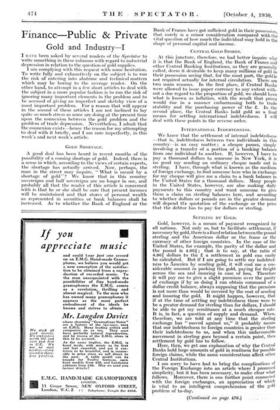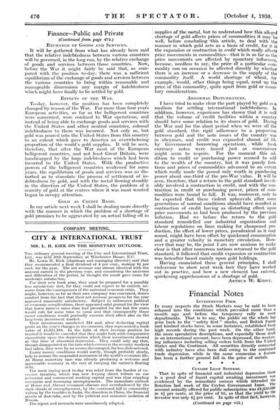Finance—Public & Private
Gold and Industry—I
I HAVE been asked by several readers of the Spectator to write something in these columns with regard to industrial depression in relation to the question of gold supplies.
I am complying with this request with some hesitation. To write fully and exhaustively on the subject is to run the risk of entering into abstruse and technical matters which may be boring to the average reader. On the other hand, to attempt in a few short articles to deal with the subject in a more popular fashion is to run the risk of ignoring many important elements in the problem and to be accused of giving an imperfect and sketchy view of a most important problem. For a reason that will appear in the second of these articles I am not inclined to lay quite so much stress as some are doing at the present time upon the connexion between the gold problem and the problem of trade depression. Nevertheless, I admit that the connexion exists—hence the reason for my attempting to deal with it briefly, and I am sure imperfectly, in this week's and next week's article.
GOLD SHORTAGE.
A good deal has been heard in recent months of the possibility of a coming shortage of gold. Indeed, there is a sense in which, according to the views of certain experts, the shortage has actually arrived. Now, perhaps, the man in the street may inquire, "What is meant by a shortage of gold" ? We know that in this country sovereigns and half sovereigns are no longer in use, and probably all that the reader of this article is concerned with is that he or she shall be sure that present incomes will be maintained and that stores of personal wealth as represented in securities or bank balances shall be increased. As to whether the Bank of England or the Bank of France have got sufficient gold in their possession, that surely is a minor consideration compared with the vital question of how much the individual may hold in the shape of personal capital and income.
CENTRAL GOLD STORES.
At this juncture, therefore, we had better inquire why it is that the Bank of England, the Bank of France and other Central Banking Institutions, as they are generally called, deem it desirable to keep many millions of gold in their possession seeing that, for the most part, the gold is not required actually for internal circulation. There are two main reasons. In the first place, if Central Banks were allowed to issue paper currency to any extent with- out a due regard to the proportion of gold, we should have what is known as inflation, with the result that prices would rise in a manner embarrassing both to trade stability and the purchasing power of the 2. In the second place, the Central Banks hold gold as a final means for settling international indebtedness. I will deal with these points in the reverse order.
INTERNATIONAL INDEBTEDNESS.
We know that the settlement of internal indebtedness —that is, indebtedness between two individuals in this country—is an easy matter ; a cheque passes, simply involving a transfer of a portion of a banking balance from one individual to another. If, however, I have to pay a thousand dollars to someone in New York, it is no good my sending an ordinary cheque made out in sterling. I have, through what is known as the medium of foreign exchange, to find someone here who in exchange for my cheque will give me a claim to a bank balance in the United States for a thousand dollars. Many people in the United States, however, are also making daily payments to this country and want someone to give them a claim on sterling balances here, and according to whether dollars or pounds are in the greater demand will depend the quotation of the exchange or the price that the debtor has to pay for dollars or sterling.
SETTLING BY Gnu).
Gold, however, is a means of payment recognized by all nations. Not only so, but to facilitate settlement, if necessary by gold, there is a Fixed relation between the pound sterling and the American dollar or the franc or the currency of other foreign countries. In the case of the United States, for example, the parity of the dollar and the pound is 4.801; that is to say, at the ratio of 4.861 dollars to the 2 a settlement in gold can easily be calculated. But if I am going to settle my indebted- ness to- America by sending gold, it will cost me a con- siderable amount in packing the gold, paying for freight across the sea and insuring in case of loss. Therefore it will pay me to give a slight premium over the parity of exchange if by so doing I can obtain command of a dollar credit balance, always supposing that the premium is not more than would be covered by the cost of sending and insuring the gold. It might happen, however, that if at the time of settling my indebtedness there were to be a greater demand for sterling than for dollars, I should be able to get my remittance at a much cheaper rate. It is, in fact, a question of supply and demand. When, therefore, we are told at any time that the sterling exchange has "moved against us," it probably means that our indebtedness to foreign countries is greater than their indebtedness to us, and when this unfavourable movement in sterling goes beyond a certain point, then settlement by gold has to follow.
Here, then, we get one explanation of why the Central Banks hold large amounts of gold in readiness for possible foreign claims, while the same considerations affect other Central Institutions.
I am sorry to have had to bring the complications of the Foreign Exchange into an article where I promised simplicity, but it has been necessary, to make clear what follows. Moreover, there is one further point connected with the foreign exchanges, an appreciation of which is vital to an intelligent comprehension of the gold problem of to-day.
(Continued on page 476.) Finance—Public and Private , (Continued front page 474.)
. EXCHANGE OF 'GOODS AND SERVICES. .
It will be gathered from what has already been said that the relative indebtedness between various countries will be governed, in the long run, by the relative exchange of goods and services between those countries. Now, before the War it might fairly be said that, as com- pared with the position to-day, there was a sufficient equilibrium of the exchange of goods and services between the various countries to bring within reasonable and manageable dimensions any margin of indebtedness which might have finally to be settled by gold.
EFFECTS OF THE WAR.
To-day, however, the position has been completely changed by reason of the War. For more than four years European activities, so far as the belligerent countries were concerned, were confined to War operations, and instead of being able to exchange goods and services with the United States and other neutral countries, colossal indebtedness to them was incurred. Not only so, but gold was poured into the United States from this country to an extent which gave to America an overwhelming proportion of the world's gold supplies. It will be seen, therefore, that after the War most of the European belligerent countries, and not least Great Britain, were handicapped by the huge indebtedness which had been incurred to the United States. With the productive powers of the belligerent countries weakened for some years, the equilibrium of goods and services was so dis- turbed as to stimulate the process of settlement of in- debtedness by gold, and with the metal flowing steadily in the direction of the United States, the problem of a scarcity of gold at the centres where it was most wanted began to occupy attention.
COLD AS CREDIT BASIS.
- In my article next week I shall be dealing more directly with the manner in which the problem of a shortage of gold promises to be aggravated by an actual falling off in
supplies of the:metal, but to understand how this alleged shortage of gold. affects prices of commodities it may be well, before concluding -this article, to deal with the manner in which gold acts as a basis of credit, for it is the expansion or contraction in credit which really affects price movements in commodities—that is in so far as the price movenients are affected by monetary influences, because, needless to say, the price Of a particular cork modity can on occasion be affected directly by whether there is an increase or a decrease in the supply of the commodity itself. A_ world shortage of wheat, for example, Would, other things being equal, send up the price of this commodity, quite apart from gold or 'none:. tary considerations.
ABNORMAL DISTURBANCES.
I have tried to make clear the part played by gold as a medium for settling international. indebtedness. le addition, however, experience has shown that it is well that the volume of credit facilities within -a; Country should have some relation to its stores of gold. During the War and for the short period when we were off the gold standard, this rigid adherence to a proportion between gold and the note issues of the country was in abeyance, and credit was expanded almost ad lib. by Government borrowing operations, ; while fresh currency notes were issued just as convenience might seem to require. For the moment this ad- dition to credit or purchasing power seemed to add to the wealth of the country, but it was purely ficti. tious and prices of commodities advanced tO an extent which really made the pound only worth in purchasing power about one-third of the pre-War value. It will be seen, therefore, that a return to the gold standard inevit- ably involved a contraction in credit, and with the con- traction in credit or purchasing power, prices of coin. modities were bound to fall. It was, moreover, only to be expected that these violent upheavals after some generations of normal conditions should have resulted in contraction of credit having as disturbing effect upon price movements as had been produced by the previous inflation. Had we before the return to the gold standard remodelled our industrial organization and labour regulations on lines making for cheapened pro- duction, the effect of lower prices, paradoxical as it may sound, might have been offset by quickened consumption and a greater velocity in monetary circulation. How- ever that may be, the point I am now anxious to make clear is that after numerous nations returned to the gold standard, it followed that credit expansion or contraction was -hereafter based mainly upon gold holdings. . Having enunciated these general principles, I shall endeavour to show next week how they have worked out in practice, and how a new element has entered,
quickening apprehensions of a shortage of gold. . _ - ARTHUR W. KIDDY.





















































 Previous page
Previous page